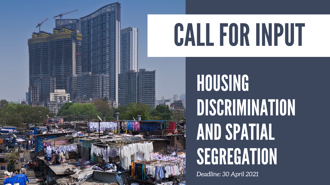Call for Inputs: Housing discrimination and spatial segregation
Issued by
Special Rapporteur on the right to adequate housing
Published
14 October 2021
presented to
The 76th session of the General Assembly in 2021
Issued by
Special Rapporteur on the right to adequate housing
Published
14 October 2021
presented to
The 76th session of the General Assembly in 2021
Issued by Special Procedures
Subject
Adequate housing
Symbol Number
A/76/408
Summary
In this report to the General Assembly the expert undertakes a comprehensive analysis of discrimination in relation to housing and makes recommendations for its elimination.
Reader-friendly summary
English:
Issued by Special Procedures
Subject
Adequate housing
Symbol Number
A/HRC/49/48
Summary
The report examines how spatial segregation undermines the equal enjoyment of the right to adequate housing and other interrelated human rights.
See available official languages
English:
Reader-friendly summary
English:
 The next thematic reports of the Special Rapporteur, Mr. Balakrishnan Rajagopal, will focus on the issue of racial, religious, caste, gender and other discrimination in relation to the right to adequate housing, including spatial inequalities and segregation in urban or rural-urban environments.
The next thematic reports of the Special Rapporteur, Mr. Balakrishnan Rajagopal, will focus on the issue of racial, religious, caste, gender and other discrimination in relation to the right to adequate housing, including spatial inequalities and segregation in urban or rural-urban environments.
The main objective of the two interlinked reports will be to identify contemporary and historical forms of discrimination and segregation that affect the right to adequate housing, to highlight good practices in the prevention of housing discrimination and segregation and to provide guidance to States on how they can fulfil their human rights obligations in this respect.
To inform his reports the Special Rapporteur welcomes contributions from States, local and regional governments, national human rights institutions, civil society organizations, academics, UN agencies and other stakeholders on the following issues:
Download the questionnaire (Word): العربية | English | Français | Español
Consultation with Local and Regional Governments
14 May 2021 at 15:00 CEST
Registration

Access to Justice for Housing Discrimination and Spatial Segregation
Consultation with judges, lawyers, human rights institutions and non-discrimination bodies
7 May 2021, 15:00 CEST (Geneva)
Registration
Consultation with States, relevant ministries, public institutions and international organizations
30 April 2021, 15:00 CEST (Geneva)

Consultation with CSOs: Housing discrimination and spatial segregation
12 April 2020: 15:00 CET
Registration
All submissions received will be published on OHCHR websites, except where confidentiality is explicitly requested.
States
Local and regional Governments
National Human Rights Institutions and Ombudspersons
Civil Society Organizations
Academia and Lawyers
International Organizations and United Nations Entities